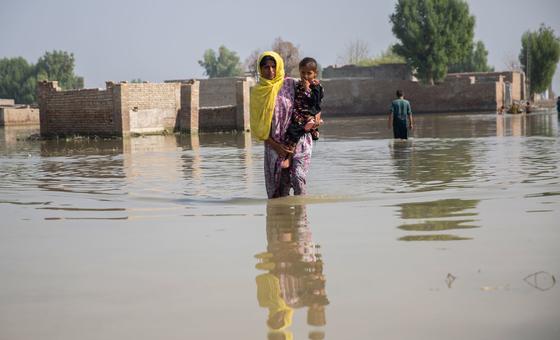The Daily Observer London Desk: Reporter- James Richards
They also underscored the need to slash carbon emissions and bolster early warning systems to safeguard nations across the world which are becoming increasingly vulnerable to extreme weather.
Speaking at the UN Headquarters, in New York, Secretary-General António Guterres said how the world responds now to Pakistan’s struggles is a “litmus test” for climate justice.
‘Double victim’
“Pakistan needs and deserves massive support from the international community,” he said.
Despite contributing less than one per cent of global emissions, Pakistan’s people face a staggering 15 times higher risk of dying from climate-related impacts.
“Pakistan is a double victim – of climate chaos, and of our outdated and unjust global financial system that prevents middle-income countries from accessing much needed resources to invest in adaptation and resilience,” he stressed.
Epochal disaster
Triggered by torrential monsoon rains, the floods submerged one third of Pakistan, claimed over 1,700 lives, destroyed two million homes, critical infrastructure, and affected 33 million people – half of them children.
In the immediate aftermath, the Government, supported by the UN launched a flood response plan, requesting $816 million to support 9.5 million of the most affected people. That appeal is about 69 per cent funded.
Even today, the response continues as UN and partners assist people in flood-ravaged areas, after further punishing rains fell this summer and Pakistan’s economy struggles to recover. Agencies such as the UN Development Programme (UNDP) are also helping people rebuild livelihoods.
‘Step forward’
Dennis Francis, President of the General Assembly, urged Member States and the broader UN system to maintain their steadfast support for recovery and reconstruction endeavours.
“I urge Member States and stakeholders to step forward and fill the funding gaps needed to mobilize resources,” he said, emphasizing the need to address funding shortfalls for both climate change adaptation and disaster risk reduction.
According to UN Children’s Fund (UNICEF), around eight million people (half of them children) in flood-affected areas, remain without access to safe water, 3.5 million children remain out of school, and about 1.5 million require lifesaving nutrition assistance.
“The situation facing many people in flood-affected areas is dire, and it comes on top of other pre-existing problems and inequities,” said Catherine Russell, UNICEF Executive Director.
“But the challenges are not insurmountable … we have a real opportunity to drive lasting positive change for Pakistan’s children.”
Beating down the door
Mr. Guterres reiterated his warning that climate chaos is knocking on everyone’s door, adding that today, however, it’s beating that door down, from the Horn of Africa to Canada.
“Carbon emissions are heating our planet, killing people, destroying communities and devastating economies,” he said.



